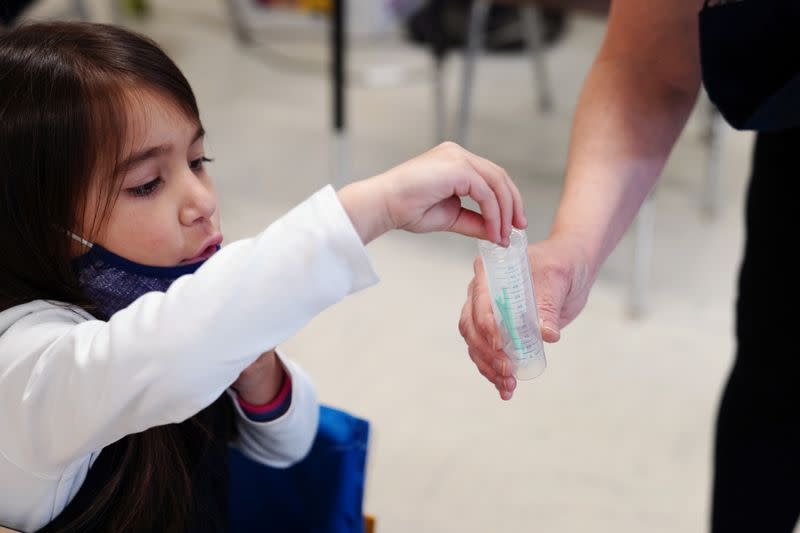By Nancy Lapid
(Reuters) – The following is a summary of some of the latest scientific studies on the new coronavirus and efforts to find treatments and vaccines for COVID-19, the disease caused by the virus.
COVID-19 attacks the pancreas
The new coronavirus is directly targeted at the pancreas and infects and damages its insulin-producing cells, according to a new study. The findings may help explain why blood sugar problems develop in many COVID-19 patients, and why there are reports that diabetes has developed as a result of the virus. The pancreas has two functions: production of enzymes that are important for digestion, and the creation and release of the hormones insulin and glucagon, which regulate blood sugar levels. In an article published in Nature Metabolism on Wednesday, researchers report that laboratory and autopsy studies show that the new coronavirus is infecting pancreatic cells involved in these processes, altering their shape, disrupting their genes and impairing their function. The new data “identify the human pancreas as a target of SARS-CoV-2 infection and suggest that beta-cell infection may contribute to the metabolic dysregulation observed in patients with COVID-19,” the authors conclude . (https://go.nature.com/36Cmtfy)
One dose of the vaccine may be sufficient for COVID-19 survivors
COVID-19 survivors may need just one shot of the new vaccines from Moderna Inc and Pfizer / BioNTech, instead of the usual two doses, because their immune systems have been given a head start in recognizing the virus, according to two separate reports that posted. this week on medRxiv for peer review. In one study among 59 health professionals who recovered from COVID-19 and received one of the vaccines, the antibody level after the first admission was higher than the levels usually seen after two doses in people without a history of COVID-19. In a separate study, researchers found that 41 COVID-19 survivors ‘developed high antibody titers’ within days of vaccination, and that levels were 10 to 20 times higher than in uninfected, unvaccinated volunteers after just one vaccine dose. “The antibody response to the first vaccine dose in individuals with pre-existing immunity is equal to or even more than the” levels found in uninfected individuals after the second vaccine dose, “the authors of the article said. “Changing the policy of giving only one dose of vaccine to these individuals will have no negative effect on their antibody titers, saving them from unnecessary pain and releasing very much needed vaccine doses,” they said. (https://bit.ly/3je4Zv4; https://bit.ly/2YG0EYf)
Gout medicine promises promise for mildly ill COVID-19 patients
Colchicine, an anti-inflammatory drug used to treat gout and other rheumatic diseases, has reduced hospitalizations and deaths by more than 20% in COVID-19 patients in a major international trial. COVID-19 patients with mild disease and at least one condition who are at high risk for complications, such as diabetes or heart disease, have received colchicine or a placebo for 30 days. In general, the risk of hospitalization or death was statistically the same in the two groups. But among the 4,159 patients whose coronavirus infections were diagnosed with a gold standard PCR test, death or hospitalization occurred in 4.6% of those who had colchicine, compared to 60% of those who received a placebo. After considering the other risk factors of patients, colchicine was associated with a statistically significant 25% risk reduction, the researchers on medRxiv reported before peer review. Patients using colchicine also had fewer cases of pneumonia. “Because colchicine is inexpensive, oral, generally safe in this study and usually does not require laboratory monitoring during use, it shows the potential as the first oral agent to treat COVID-19 in the outpatient setting,” he said. the researchers said. . (https://bit.ly/3oDSDgY)
Oxford / AstraZeneca vaccine may work better with monthly doses
Among the recipients of the COVID-19 vaccine from the University of Oxford and AstraZeneca, prolonging the interval between the first and second doses led to better results, researchers said in an article published Monday before peer review by The Lancet on its preprint website. For volunteers aged 18 to 55 years, the vaccine efficacy was 82.4% with 12 or more weeks between doses, compared to 54.9% when the booster was administered within 6 weeks after the first dose. The longest dose interval between doses given to older volunteers was 8 weeks, so there was no data on the efficacy of a 12-week dose gap in the group. The medical regulator in Europe said there was not enough data to determine how well the vaccine would work in people over 55. Given its findings, the authors say ‘a second dose given after a period of three months is an effective strategy … best to roll out a pandemic vaccine when stocks run short in the short term is. ‘(https://bit.ly/3apMSyt)
Open https://tmsnrt.rs/3c7R3Bl in an external browser for a Reuters image on vaccines being developed.
(Reporting by Nancy Lapid and Alistair Smout; Edited by Bill Berkrot)
Originally published
